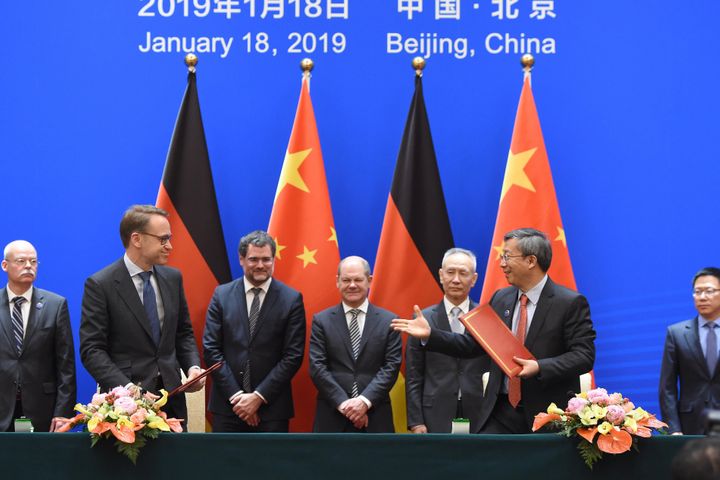 China's Top Financial Think Tank Introduces 10 New Members
China's Top Financial Think Tank Introduces 10 New Members(Yicai Global) Jan. 31 -- The Chinese Economists 50 Forum, the country's leading financial think tank and led by Vice Premier Liu He, has replaced 10 members of its roster following the end of its latest five-year office term.
Fang Xinghai, vice chairman of the China Securities Regulatory Commission, and Yu Bin, director-general of the General Office of the State Council's Development Research Center, are among the new inductees, according to an update on the brain trust's website.
Central bank Governor Yi Gang, Boao Forum for Asia Vice Chairman Zhou Xiaochuan and Guo Shuqing, chairman of the China Banking and Insurance Regulatory Commission, are among the 40 to keep their posts.
Below are some recent public comments from the new members to learn more about the issues they believe are a top priority.
Fang Xinghai -- Equity financing will be offered to early high-tech firms
China's Central Comprehensively Deepening Reforms Commission has approved the CSRC's plan for a science and technology board on the Shanghai Stock Exchange, Fang said at the World Economic Forum in Davos, Switzerland, last week. The board is an important part of China's supply-side structural reform and will encourage Chinese tech firms to grow faster and innovate more, he added.
Liao Min -- Blockchain scrutiny is arduous work for regulators
In the four major areas of financial technology, blockchain will be the most critical, the deputy director of the Central Financial and Economic Affairs Commission said at a recent open forum, suggesting the tech was more important than internet payments, network financing and smart investment technology.
More challenges will come from blockchain supervision than the other areas, but it is the most promising, even if the most uncertain, he added.
Liu Shangxi -- Positive fiscal policies are not a major stimulus
Uncertainty is common in modern times, according to the head of the China Academy of Fiscal Sciences. The supply-side structural reform will help level out supply and demand in financial services, public services and human capital, reducing the ambiguity about what is to come, he added.
If ignored, this uncertaint could lead to economic and financial crises, so it is important to stay on top of them, Liu said.
Liu Yuanchun -- China's consumption structure has changed dramatically
Consumption of physically commodities has weakened, but retail sales are still strong, the vice president of Renmin University told Yicai Global in an exclusive interview. From January through May last year, the service production index rose 8.1 percent annually, while freight growth was in double digits, he added.
Lu Lei -- Foreign debt risk is under control, yuan will remain stable
China's macro economy will face constant change but remain mostly stable in the long run, the deputy administrator of the State Administration of Foreign Exchange said at China Depository & Clearing's 2018 annual meeting for overseas investors last month.
The Chinese economy is generally stable and its economic structure is continually being stabilized, leading to low inflation, low unemployment and low interest rates, Lu said. The country still faces challenges in international trade protectionism, deleveraging and countercyclical policies, he added.
Xu Zhong -- China's economic growth is transitioning
China's economy is switching to high-quality development from high-speed growth, the head of the central bank's research bureau said recently. The country must adapt to the gradual slowdown in broad money and private financing, he added.
Zhang Xiaojing -- Deleveraging will continue
Deleveraging will be a priority over the next two or three years, at least in policy terms, the deputy chief of the Chinese Academy of Social Sciences' Institute of Economics said in October. If it proves effective within three years, there will likely be a framework for regulations and policies, he added, saying as household debt ratios rise it is feasible for the government leverage ratio to rise.
Zhang Xiaopu -- Direct banking is just the start of online banking
Direct banking is only the initial stage of internet banking, the deputy director of the Central Financial and Economic Affairs Commission's macroeconomic bureau wrote in his book, The Future Intelligent Bank.
Yao Yang -- Macro control needs time
Macro control cannot replace economic reforms, it needs time, the head of Peking University's National School of Development said at a forum held by the school.
Yao suggests decision-making authorities should adopt two emergency measures and one radical solution for a permanent cure. The latter would see the central bank, banking and insurance and securities watchdogs, and the cabinet's Financial Stability and Development Committee review policies thoroughly to see which should stay and which should go.
The direction of the new asset management policies is correct, but not all innovations from shadow banking should be eliminated, Yao added.
Yu Bin -- Logistics development will depend on tech, business model innovation
The rise of the logistics sector stemmed from the manufacturing industry, but now depends on tech advancement and business model innovation, according to Yu.